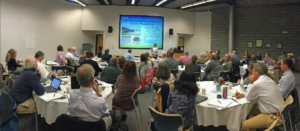A partnership between The Nature Conservancy (TNC) and the Delaware Maryland Agribusiness Association, and funding from USDA Natural Resources Conservation Service (NRCS), has been providing tools to farmers in Delaware, Maryland, and Virginia to prevent nutrient and sediment pollution in the Bay. Farmers want to prevent pollution while also increasing efficiency and productivity on their lands, so the group is providing tools to help farmers create custom conservation plans.

The group met in Winter 2017 to discuss the successes in their first year.
The project, called The Delmarva Conservation Partnership, includes over 30 groups including conservation organizations, agribusiness, government agencies, and scientists from University of Maryland Eastern Shore, USDA, Penn State, Virginia Tech, Cornell University and University of Delaware. Their goals include improving nutrient management practices on farms, protecting natural filters like wetlands and buffers, and reducing tens of thousands of pounds of nitrogen, phosphorous, and sediments flowing into local watersheds.
Their website features success stories from each state. Farmers in Delaware are using GPS to manage fertilizer application on their farm to make sure applications are as efficient as possible. A farmer in Maryland is using cover crops in between his corn and soybean plants to prevent weeds and a bioreactor filter underground that breaks down nitrogen compounds in runoff water. In Virginia, farmers are using vegetative buffers to preserve wetlands on their property, and raising the water level in other areas to restore permanent wetlands.
The partnership has led to increased underwater grasses, blue crab populations, and water quality. You can follow their story with the hashtag #Fridaysonthefarm.
